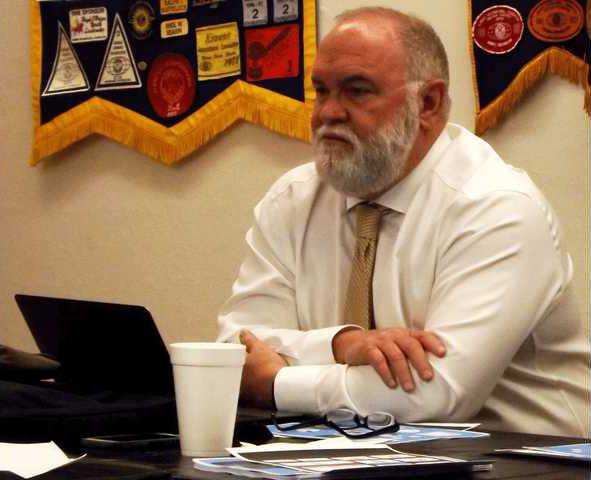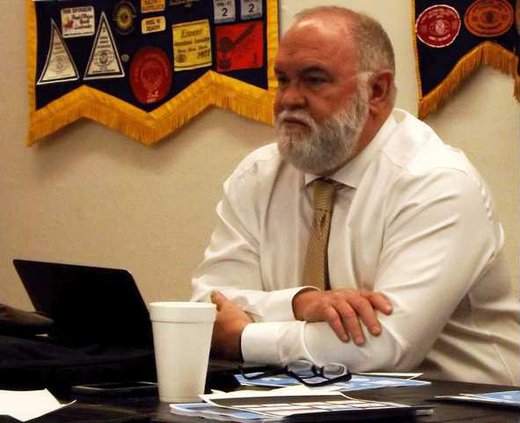Like the tip of an iceberg, the portion of the interest that you and Google can see is a small portion of a larger structure. Experts estimate that the general public can see around 1 to 4 percent of the internet, according to Charles Perkins, Barton Community College’s expert on cyber attacks.
Perkins, BCC vice president of institutional effectiveness, talked about the so-called Dark Web at the Great Bend Kiwanis meeting. It was similar to information he shared with college trustees after a cyber attack on BCC in November 2015 that cost more than $30,000 to clean up. The following year, Barton computers were targeted by ransomware — a kind of malware that encrypts data on a computer and holds it hostage.
None of these threats existed when Perkins came to work for the college some 25 years ago. He recalls talking to former Barton President Dr. Jimmie Downing about the need to get on the internet, and later teaching employees how to use email. Now, he gets 500 emails a day and 400 of them are trash.
The Dark Web lies in that hidden portion of the internet known as the Deep Web – protected from search engines by passwords. The Deep Web isn’t all sinister; it includes such things as email and social media passwords – not to mention bank accounts – and the college’s databases. According to Perkins, the Dark Web is a subset of the Deep Web with both legal and illegal sites. It provides anonymity for people who might need it.
A customer may use the Dark Web to commit a crime. In Australia, where guns are illegal, it’s often used to buy guns. In the United States, drugs and pornography are more common purchases. It can also be used to shut down someone else’s website temporarily with what is called a Distributed Denial of Service attack. A DDoS attack attempts to make an online service unavailable by overwhelming it with traffic from multiple sources.
Purchases on the Dark Web
It uses cyber currencies such as BitCoin for financial transactions. And even though BitCoin’s value is volatile, Perkins noted that 85 percent of the world’s population lives in places with unstable currencies. According to some estimates, $1,200 on the Dark Web can buy:
• one fake U.S. passport
• two handguns
• six fake driver’s licenses
• 12 targeted email account hacks
• 48 targeted DDoS attacks
• 320 stolen credit cards
It can also buy one code-signing certificate, which tells users that a site’s software can be trusted and does not come from a malicious hacker.
Identity theft is common on the Dark Web. According to consumer credit reporting agency Experian, Social Security numbers sell for $1, driver’s license information for $20 and diplomas for $100-400. Stolen credit cards start at $5 with the CVV number, and cost $30 or more with “fullz info,” a slang term that means an individual’s full information: name, Social Security number, birth date, account numbers and other data.
Illegal purchases on the Dark Web are dangerous, but common. “It happens in Great Bend,” Perkins said. Talking to the Kansas Bureau of Investigation the most common crimes going on here are porn and human trafficking.
Governments are also involved in cyber attacks. Russia cyber security company Kaspersky provided antivirus software that has a hidden feature. “They were spying on everyone who put it in their machine,” Perkins said.
Norse Corporation estimates that the U.S. is hit by cyber attacks 5,000 times per hour, but our nation is also the source of attacks. See the attacks in real time at the Norse Corporation: http://map.norsecorp.com/#/ or the Threatbutt Internet Hacking site https://threatbutt.com/map/
The Federal Bureau of Investigation does monitor the Dark Web and has successfully shut down some criminal activity, such as a child pornography site called Playpen. One of the biggest busts was in 2013 when the FBI announced it has arrested the alleged administrator of Silk Road, an underground marketplace for narcotics with internet shopping carts and other amenities.
Perkins understands why someone in a third-world country might hold a computer hostage for $250 – the going price for ransomeware. In some countries, that is a lot of money.
Here, “we warn people up front, don’t go to the Dark Web to play,” he said.
As for the ongoing barrage of cyber attacks, Perkins said the Dark Web is here to stay.
“There is not a happy ending,” he said. “We’ll deal with these issues the rest of our lives.”





